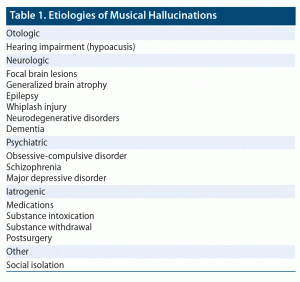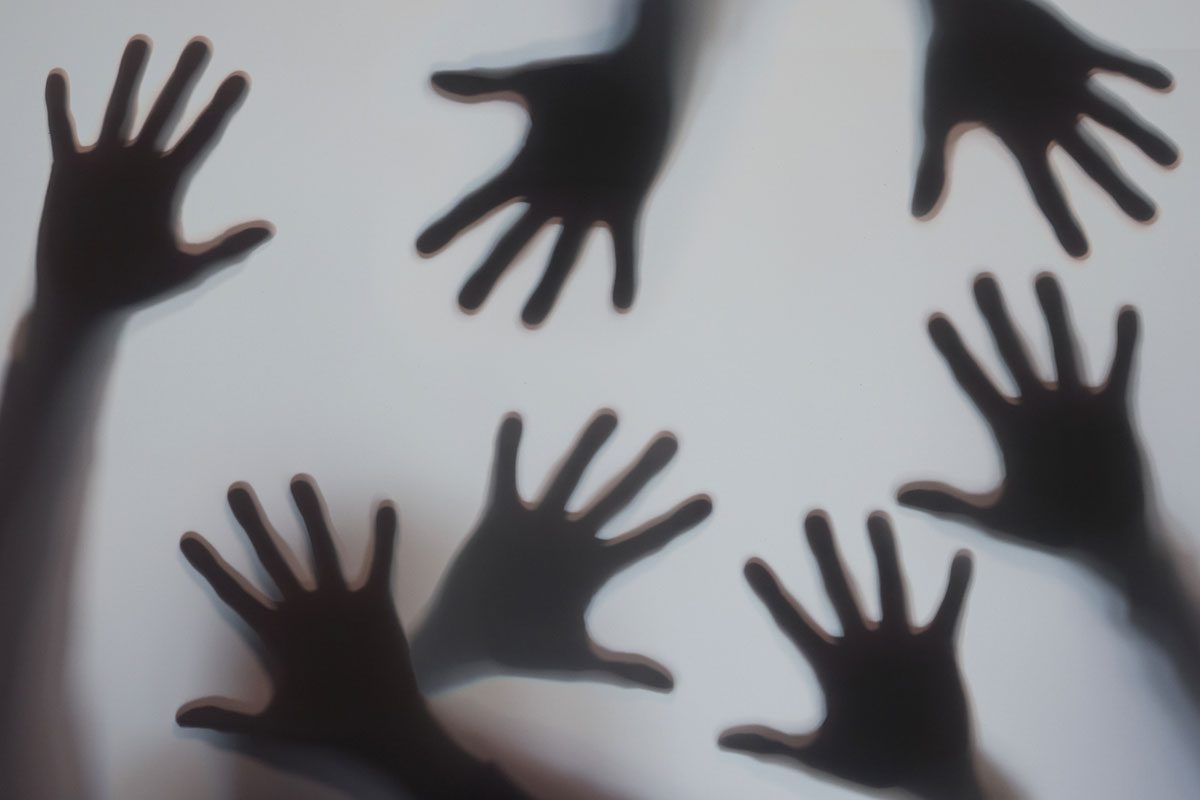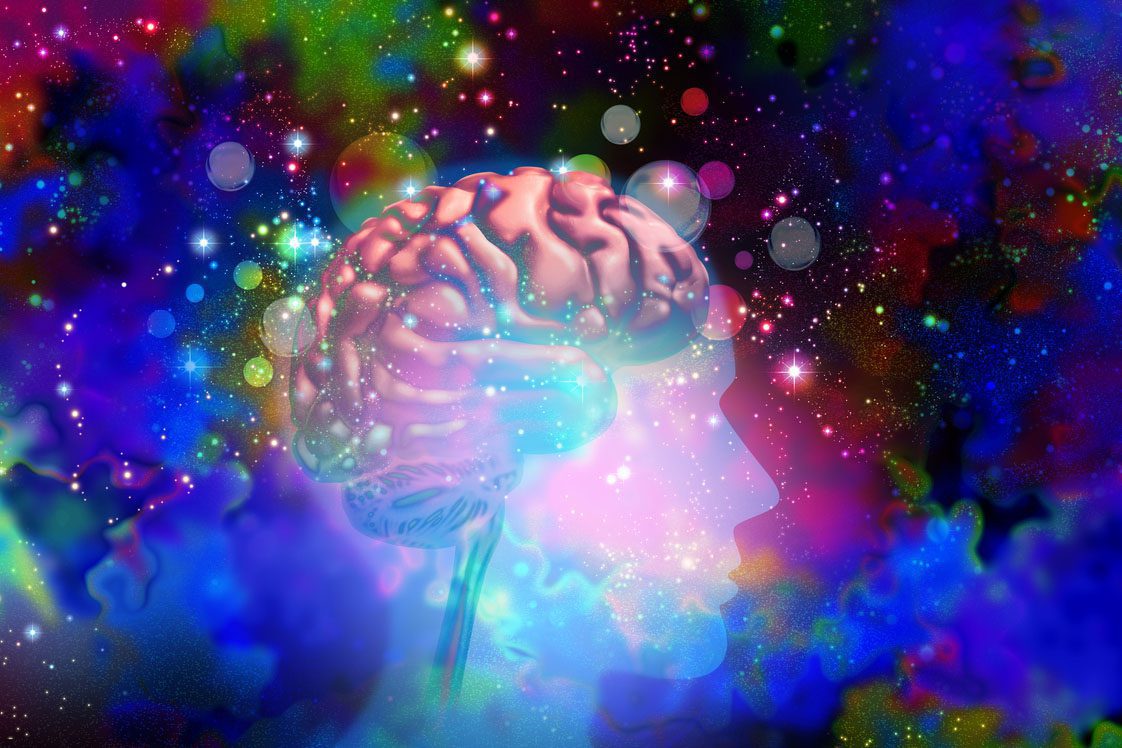
Prim Care Companion CNS Disord 2022;24(3):21cr03058
To cite: Baweja R, Hasoglu T, Joshi A. Musical hallucinations associated with adverse childhood events. Prim Care Companion CNS Disord. 2022;24(3):21cr03058.
To share: https://doi.org/10.4088/PCC.21cr03058
© Copyright 2022 Physicians Postgraduate Press, Inc.
aDepartment of Psychiatry and Behavioral Health, Penn State College of Medicine, Hershey, Pennsylvania
*Corresponding author: Ritika Baweja, MD, Department of Psychiatry and Behavioral Health, Penn State College of Medicine, Penn State Health Milton S. Hershey Medical Center, 500 University Drive, Hershey, PA 17033 ([email protected]).
Musical hallucinations are a rare nonverbal, complex subtype of auditory hallucinations, also known as Oliver Sacks syndrome and auditory Charles Bonnet syndrome.1 The pathophysiologic mechanism of musical hallucinations is not clearly understood but may include otologic, neurologic, psychiatric, and iatrogenic causes.2 We report a unique case of a patient with chronic hearing impairment who presented with musical hallucinations related to adverse childhood events.
Case Report
An 83-year-old woman with past medical history of hypertension was admitted to the internal medicine service for exacerbation of chronic obstructive pulmonary disease. Her psychiatric history included unspecified anxiety disorder treated with sertraline 50 mg/d. She had a history of physical and emotional abuse by her mother and other caregivers in an orphanage in early childhood. She was concerned about her great grandchild possibly being neglected at home amid an environment of substance abuse and family conflict. No significant cognitive deficits were observed. She scored 27/30 on the Montreal Cognitive Assessment.3 Neuroimaging (computed tomography and magnetic resonance imaging [MRI]) and electroencephalography detected no clinically significant abnormalities. Neurologic examination was unremarkable except for preexisting chronic, bilateral, asymmetric sensorineural hearing impairment.
She reported musical hallucinations associated with adverse childhood events ranging from background soft music to continuous repetitive songs in her great grandson’s voice. The initial abrupt emergence of musical hallucinations 1 to 2 years prior to her current admission was not in the immediate aftermath of the development of hearing impairment. The hallucinations gradually worsened over time and included voices of her grandson abusing her great-grandson. Several medications such as quetiapine, carbamazepine, and divalproex were trialed but discontinued due to poor tolerability, with quetiapine causing worsening of musical hallucinations. She was advised to utilize hearing aids and encouraged to use behavioral interventions including distraction techniques and minimization of social isolation. She had suboptimal response with combined interventions of medication and therapy.
Discussion
Musical hallucinations are more common in women and older individuals (aged > 60 y).4,5 Multiple etiologies can contribute to the development of musical hallucinations2,6,7 (Table 1), with otologic causes being the most common predisposing factor. Whereas verbal auditory hallucinations have been associated with adverse childhood events,8 this case raises the possibility of trauma as a contributing factor in the development of musical hallucinations later in life.
Musical hallucinations are likely due to a complex interplay between central neurocircuitry, peripheral auditory structures and neurotransmitters, connecting auditory cortices, memory, and emotional processing.2 The pathophysiologic mechanism is not clearly understood. Multiple neurotransmitters including γ-aminobutyric acid, glutamate, acetylcholine, serotonin, dopamine, opioid peptides, calcitonin, and substance P in auditory pathways have been implicated.2 Worsening musical hallucinations associated with cholinergic deficit related to anticholinergic medications have been reported.5
Musical hallucinations are considered to derive from perceptual experiences accumulated in musical memory circuits. Studies9 have shown patterns of spontaneous brain activity on functional MRI in patients with elementary (eg, tinnitus, buzzing) and complex (musical) hallucinations. A small number (4%) of patients with musical hallucinations who also experienced verbal auditory hallucinations with no evidence of coexisting psychotic disorder have been encountered.10 There is a possible link between musical and verbal auditory hallucinations in older patients in whom musical hallucinations may evolve into verbal auditory hallucinations over time.11
Management should include a multidisciplinary assessment to identify underlying causes, followed by appropriate interventions.12,13 There is no definitive treatment for musical hallucinations. Interventions are aimed at treating the known underlying cause or withholding an offending agent. Nonpharmacologic treatment includes lifestyle advice, reassurance, and explanation of the nature of musical hallucinations, optimization of hearing, and behavioral modifications such as distraction techniques.4 Case reports have demonstrated efficacy of pharmacologic interventions, including anticholinesterase inhibitors, anticonvulsants, and antipsychotics.2 Musical hallucinations experienced in the context of brain injuries and epilepsy tend to respond well to anticonvulsants.4
Published online: May 3, 2022.
Relevant financial relationships: Dr Joshi’s spouse is a principal investigator on a research grant made available by AstraZeneca through the BIG 10 cancer consortium. Drs Baweja and Hasoglu report no financial or other relationships relevant to the subject of this article.
Funding/support: None.
Previous presentation: Presented as a poster at the Institute on Psychiatric Services; San Francisco, California; October 30–November 2, 2014.
Additional information: Information has been de-identified to protect anonymity.
References (13)

- Kukstas C. Auditory Charles Bonnet syndrome: a case report. Br J Gen Pract. 2019;69:362–363. PubMed CrossRef
- Zein M, Sher Y. Musical memories-musical hallucinations in a lung transplant recipient: case report and literature review. J Acad Consult Liaison Psychiatry. 2021;62(1):140–149. PubMed
- Nasreddine ZS, Phillips NA, Bédirian V, et al. The Montreal Cognitive Assessment, MoCA: a brief screening tool for mild cognitive impairment. J Am Geriatr Soc. 2005;53(4):695–699. PubMed CrossRef
- Coebergh JAF, Lauw RF, Bots R, et al. Musical hallucinations: review of treatment effects. Front Psychol. 2015;6:814. PubMed
- Colon-Rivera HA, Oldham MA. The mind with a radio of its own: a case report and review of the literature on the treatment of musical hallucinations. Gen Hosp Psychiatry. 2014;36(2):220–224. PubMed CrossRef
- Ferreira TF, Dehanov S, Figueiredo I, et al. Musical hallucinations in a mixed episode: interaction between musicality and mood. Psychiatry Res. 2021;295:113633. PubMed CrossRef
- Evers S, Ellger T. The clinical spectrum of musical hallucinations. J Neurol Sci. 2004;227(1):55–65. PubMed CrossRef
- Wearne D, Curtis GJ, Melvill-Smith P, et al. Exploring the relationship between auditory hallucinations, trauma and dissociation. BJPsych Open. 2020;6(3):e54. PubMed CrossRef
- Marschall TM, Ćurčić-Blake B, Brederoo SG, et al. Spontaneous brain activity underlying auditory hallucinations in the hearing-impaired. Cortex. 2021;136:1–13. PubMed CrossRef
- Kumar S, Sedley W, Barnes GR, et al. A brain basis for musical hallucinations. Cortex. 2014;52(1):86–97. PubMed CrossRef
- Fischer CE, Marchie A, Norris M. Musical and auditory hallucinations: a spectrum. Psychiatry Clin Neurosci. 2004;58(1):96–98. PubMed CrossRef
- Rocha SCM, Kii MA, Pereira CB, et al. Multidisciplinary assessment of patients with musical hallucinations, tinnitus and hearing loss. Psychopathology. 2015;48(4):251–255. PubMed CrossRef
- Cope TE, Baguley DM. Is musical hallucination an otological phenomenon? a review of the literature. Clin Otolaryngol. 2009;34(5):423–430. PubMed CrossRef
Enjoy this premium PDF as part of your membership benefits!






